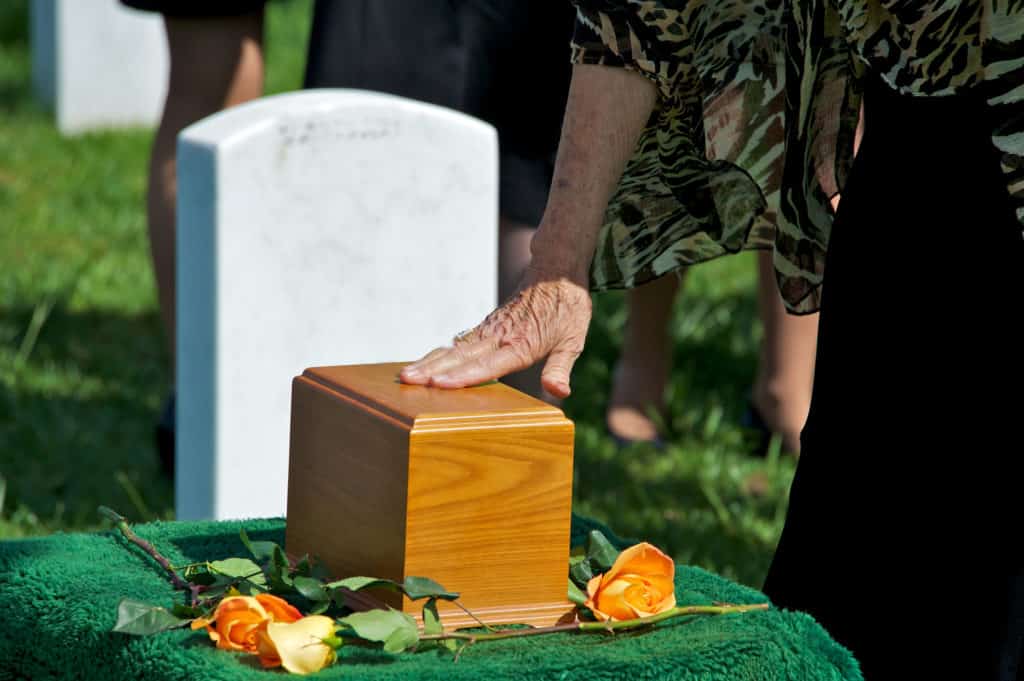There are some topics we had much rather tackle than those about death. However, this topic seems to come up quite often. Using cremation as a method to put to rest our deceased loved ones has become an increasingly popular option. But, is it an acceptable Biblical practice? This is a question that some Christians wrestle with. Some believe that cremation can come in conflict with Christian belief about bodily resurrection in the future, while others think it doesn’t matter. Let’s ask the question, “what does the Bible say about cremation” and see what conclusions we can draw.
What Does The Bible Say About Cremation – In General
Certainly, as Christians, we believe that the essence of our lives is much more than just a human body. We believe that, at death, we enter into the presence of our Lord Jesus Christ in a spiritual body of some sort and that we will eventually have a new body that is made in perfection.
However, upon the death of our physical body, our loved ones have to make decisions as to what to do with our dead body. There may be a traditional funeral or graveside funeral services, and a traditional burial of the human body in the ground as a part of the funeral arrangements.
Many people, today, however, are choosing cremation which gives them the option of doing quite a few things with the cremated remains of their loved ones. I think we might be surprised how many Christians are concerned that God forbids cremation or they are simply asking “what does the Bible say about cremation.”
Although in 2017, for the first time in American history, statistics showed that people had chosen cremation of the body over what has been the standard practice of burial of the body.
However, Christians, as well as almost everyone, want to be comforted that they have made the correct decision about their loved one’s funeral service and their remains. So, what is the Biblical perspective of what has become a common practice of cremation? Let’s see what the Bible says about cremation.

What Does The Bible Say About Cremation – Yes or No?
Actually, there doesn’t appear to be any explicit scriptural command about a person’s remains. When the Bible doesn’t give a specific command about something then we exercise our Christian freedom in making those decisions. So, as to what the Bible tells us, it looks as if the burial was a more common practice in the Old Testament as burial occurs about 200 times alone.
However, it seems totally acceptable to cremate the body. Let’s take a look at a few Bible verses and look at why people might choose cremation and also why believers object are at least skeptical about the deceased’s body being cremated.
What Does The Bible Say About Cremation – 2 Scriptures
This first Bible passage of scripture that we will use found in 1 Corinthians 15 doesn’t actually mention cremation. It seems to continue to speak of what was the more normal practice of burial.
“It is the same way with the resurrection of the dead. Our earthly bodies are planted in the ground when we die, but they will be raised to live forever. Our bodies are buried in brokenness, but they will be raised in glory. They are buried in weakness, but they will be raised in strength. They are buried as natural human bodies, but they will be raised as spiritual bodies. For just as there are natural bodies, there are also spiritual bodies.” 1 Corinthians 15:42-44
That certainly doesn’t rule out cremation. However, it appears that, overall, in the Old and New Testaments that a traditional burial was used as the primary means of taking care of the body after death.
An Old Testament Passage About Cremation
One of the most notable times that cremation is mentioned in the Bible occurs in 1 Samuel, chapter 31. The army of the Philistines had attacked Israel, and many men of Israel were slaughtered on Mount Gilboa. Ultimately, King Saul, along with his three sons, his armor-bearer, and his troops died that day.
“But when the people of Jabesh-Gilead heard what the Philistines had done to Saul, all their mighty warriors traveled through the night to Beth-shan and took the bodies of Saul and his sons down from the wall. They brought them to Jabesh, where they burned the bodies.” 1 Samuel 31:11-12
However, when the Philistines went out to strip the bodies of any valuables, they cut off Saul’s head, and there is also speculation that they may have mutilated the bodies of his sons as well. The people of Israel chose to cremate Saul and his sons rather than transport mutilated, decaying bodies somewhere else for the normal burial methods of the Jews.
So, It’s Not a Sin To Be Cremated?
From all that we can see in the Bible, there is no indication that it would be a sin to be cremated. We will talk in more detail about the reasons why some Christians are concerned about cremation.
Reasons that Christians Might Choose Burial Over Creation
Although our position is that the cremation which is commonly practiced in today’s culture is totally acceptable, there are some understandable reasons that many Christians choose burial as the preferred method.

The Resurrection of The Body
Since Scripture teaches that our earthly bodies will be raised at the end of this age when Christ returns, the concept of cremation gives pause to some Christians. Let’s look at a famous passage that we hear shared at many funerals.
“We tell you this directly from the Lord: We who are still living when the Lord returns will not meet him ahead of those who have died. For the Lord himself will come down from heaven with a commanding shout, with the voice of the archangel, and with the trumpet call of God. First, the believers who have died[b] will rise from their graves. Then, together with them, we who are still alive and remain on the earth will be caught up in the clouds to meet the Lord in the air. Then we will be with the Lord forever.” 1 Thessalonians 4: 15-17
There are several other passages mentioning the resurrection of the believer’s body when Christ returns. Here is a prophecy from the Old Testament:
“As for you, go your way until the end. You will rest, and then at the end of the days, you will rise again to receive the inheritance set aside for you.” Daniel 12:13
So, in general, Christians believe in a bodily resurrection and that we will receive new and glorified bodies. So, the idea of having the body more intact is something that Christians will sometimes have on their mind. However, others who believe in our bodily resurrection totally dismiss any fear that cremation will interfere with that.
Some Christians have a notion or preference that they want their body to remain somewhat intact and not be in form of ash when it is time for the resurrection. It’s a thought that is understandable and is a question that should be acknowledged that it is a genuine concern in the mind of some believers.
However, bodies that have been buried for hundreds and thousands of years have certainly deteriorated to almost nothing also. It’s our belief that a God who is supernatural enough to raise buried bodies that are extremely decayed can certainly raise ashes! He would have no more problem raising or assembling the ashes of those who were cremated than he would in assembling brittle and decayed remains of human bones.
For a God who spoke and the world came into being, bringing ashes together, even if they were tossed to the wind, is of no challenge at all to the God of creation.
Also, there is this passage found in Mark that would seem to indicate that there is no problem for God in terms of resurrecting bodies in any form, even in the “four winds.”
“And he will send his angels and gather his elect from the four winds, from the ends of the earth to the ends of the heavens.”
Mark 13:27
Burning the Bodies Seen as Dishonorable
In the Bible, there are quite a number of passages where bodies were cremated rather than buried because in some of those cultures it was looked at as dishonoring the bodies by burning them. Also, the idea of the burning of bodies was sometimes attached to those who had gravely sinned. It was looked at as a desecration rather than a traditional burial which, at the time, was looked upon as the more honorable way to treat the body of the deceased.
In this passage from the book of 2 Kings, it looks like Josiah actually had bones removed from the tombs in order to defile the altars that had been to false Gods.
“Then Josiah looked around, and when he saw the tombs that were there on the hillside, he had the bones removed from them and burned on the altar to defile it, in accordance with the word of the Lord proclaimed by the man of God who foretold these things.”
2 Kings 23:16
There is also the story of Achan, where he disobeyed God in a major way by taking the spoils of a battle in a selfish manner that was against what God had said.
Israel was defeated at the battle of Ai when they should have won decisively. However, we find later that they lost because of Achan’s sin in taking the spoils of battle in a manner that went against the word of God. Not only did Israel stone Achan and his family, but they burned the bodies as well.
“Then Joshua said to Achan, “Why have you brought trouble on us? The LORD will now bring trouble on you.” And all the Israelites stoned Achan and his family and burned their bodies.”
Joshua 7:25
So, that is another instance where people burned the bodies of those who had done evil in God’s sight, therefore bringing on more dishonor.
So, you can understand why some Christians might question the practice of cremation. In those cultures, it could mean showing dishonor. However, in our culture, most do not see it that way at all. Today, when we choose to cremate a body we do not prescribe any less honor to that person or their body than we do to someone who has been buried.
However, some will still believe that burial is an act of great respect, more so than cremation. That is simply opinion and culture-based. It doesn’t mean that God dishonors cremation.

Uncomfortable With Loved One’s Body Being Burned
This one is simple and very understandable. A believer knows that whether the body is cremated or buried, the person is in God’s hands and that body is no longer housing that person anymore. But, still when someone thinks about a special person with whom they have shared their lives, sometimes they simply do not want that person’s body to be burned up.
We believe that is of no consequence to the deceased, However, in the mind of some remaining family members, they can be uncomfortable with the idea of their loved one’s body being burned. That might cause turmoil in the emotions. However, on the other hand, some choose cremation because they struggle emotionally with the thought of their loved one being in the ground.
And, once again, these seem to be personal preferences that are certainly okay for people to have. It’s not our place to make these decisions for a grieving family, but to help and encourage them in any way possible.
Reasons Cremation Might Be Chosen Over Traditional Burial
The Cost Factor of Cremation vs Traditional Burial
The costs of dealing with a person’s remains using the practice of cremation vs. traditional burial practices are quite different.
The cost of cremation is typically much less than the cost of an average funeral in which the body is buried inside of a casket.
Keeping the Remains Close By
Some may be inclined to choose cremation so they can keep the ashes of their loved one in an urn and have it near them for the rest of their life.
There are many, many choices of beautiful urns and the urn doesn’t seem to be quite the morbid symbol of death that a casket can sometimes be. Therefore, this may encourage people to choose cremation.
The Deceased Wishes For Scattered Ashes
There are quite a few people who, prior to their death request that their body is cremated and that their ashes be scattered at a particular place.
They may have a favorite place on the ocean, a beach, a forest, or a river that they love. People make requests of all kinds when it comes to spreading their ashes.
What Does The Bible Say About Cremation – In Conclusion
It appears to us that the Bible does not speak directly to the cremation practices of today. It would appear that the choice of cremation is fine for a follower of the Lord Jesus Christ if that is what is decided by the family.
There are no “cremation Bible verses” to answer the question specifically. And, although some of the verses that are found about burning bodies after death sometimes indicate that the cremation was done for purposes of dishonor, that does not seem to apply to today’s culture at all.
So, what does the Bible say about cremation? According to the interpretation of many, we would say that everyone, including followers of Jesus Christ, is free to choose traditional burial or cremation.
And, although at LivingPraying.com, we typically write about the practices and standards of Protestant Christianity, we will mention that the Catholic church prohibited cremation until the 1960s. They do allow for cremation now, however, they ask that the ashes be not be kept in urns at home or scattered at sea, but kept in a “sacred place” such as a church cemetery. The Catholic church guidelines also state that the ashes should not be divided up between various family members.
Also, if you are Islamic, cremation is considered “unclean” and you are forbidden from being a part of any cremation ceremonies.
One Last Resource
We would also direct your attention to one of the best posts that we have seen about the spiritual aspects of making this choice in a brief article by Dr. John MacArthur here.
He makes one of the most concise and well-treated Biblical arguments stating that the practice of cremation for Christians today saying that the body is going to decompose anyway and that there is no Biblical prohibition against cremation.
This is not the most exciting topic that we, or anyone else, will write about. However, these are important issues to people and people want to make the best decision possible in each case.
We hope that, in some way, this post has helped you in your decision-making in what can be a tremendously hard time.
God will not withhold his love from you because you choose cremation or you choose a total body burial.
Blessings to you.





Leave a Reply